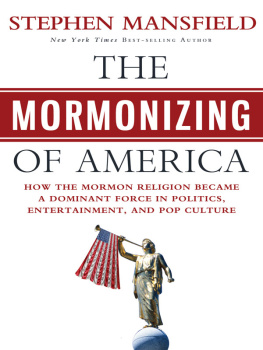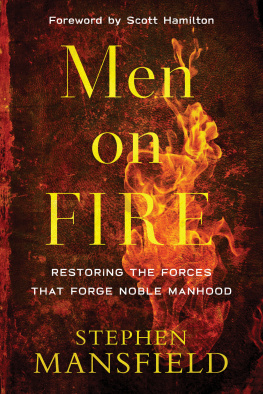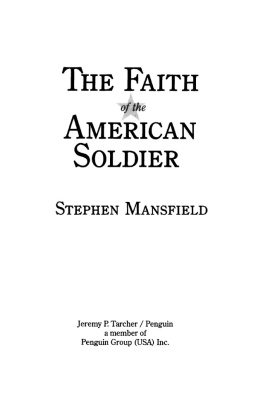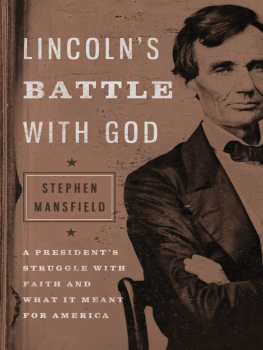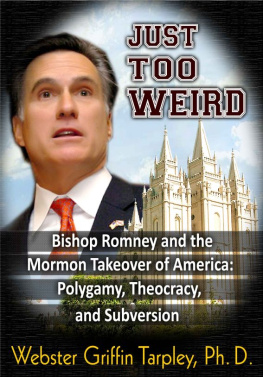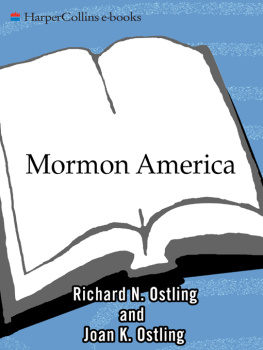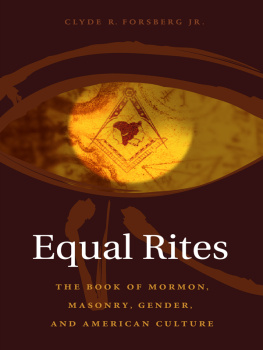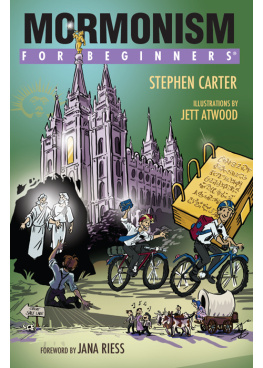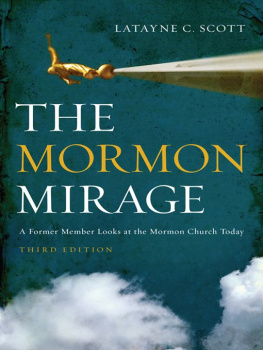
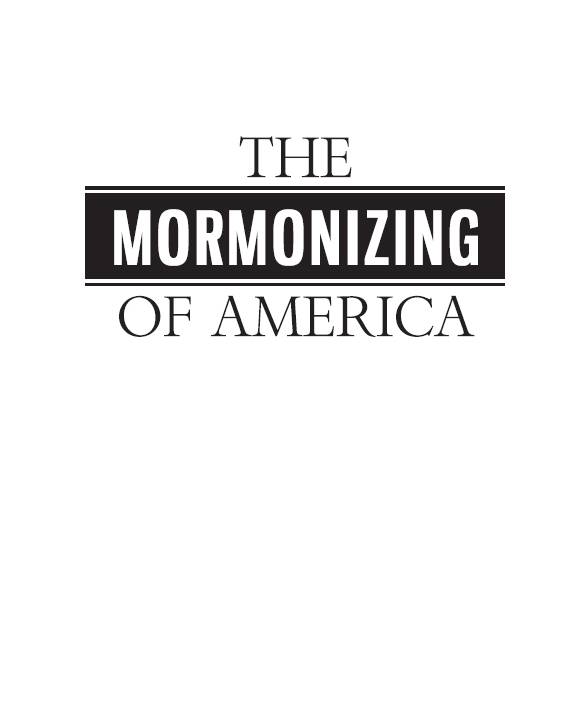

Copyright 2012 by Stephen Mansfield
Published by Worthy Publishing, a division of Worthy Media, Inc., 134 Franklin Road, Suite 200, Brentwood, Tennessee 37027.
eBook available at www.worthypublishing.com
Audio distributed through Oasis Audio; visit www.oasisaudio.com
Library of Congress Control Number: 2012937694
All rights reserved. No part of this publication may be reproduced, stored in a retrieval system, or transmitted in any form or by any meanselectronic, mechanical, photocopy, recording, or any otherexcept for brief quotations in printed reviews, without the prior written permission of the publisher.
For foreign and subsidiary rights, contact Riggins International Rights Services, Inc.; www.rigginsrights.com
ISBN: 978-1-617950-78-0 (hardcover)
Cover Design: Christopher Tobias, Tobias Design
Cover Photos: Composite angel, Paul Chesley/Getty Images; Flag, iStockphoto.com
Interior Typesetting: Susan Browne Design
Printed in the United States of America
12 13 14 15 16 17 18 LBM 10 9 8 7 6 5 4 3 2 1
To
David Foster
(19532012)
ALSO BY STEPHEN MANSFIELD
Never Give In: The Extraordinary
Character of Winston Churchill
Then Darkness Fled: The Liberating
Wisdom of Booker T. Washington
Forgotten Founding Father: The Heroic
Legacy of George Whitefield
The Faith of George W. Bush
The Faith of the American Soldier
Benedict XVI: His Life and Mission
The Faith of Barack Obama
The Search for God and Guinness
CONTENTS
Acknowledgments
I was five minutes into Dr. Grant Underwoods class at Brigham Young University when I made my strategic mistake. Grant had graciously invited me to participate in his Mormonism in the American Experience class and I had eagerly accepted. Once I arrived, he urged me to introduce myself to the students. Thats when I nearly fell into the pond. I talked about my life for a while and then explained how my fascination with faith had brought me to them. Feeling the moment, I wanted to say something about how welcoming everyone had been, not just at BYU but at headquarters in Salt Lake City and everywhere I had spoken with LDS scholars, politicians, or believers around the country. Thats when I used one of my favorite throwaway lines: Will you adopt me?
I say it all the time. If someone bakes something wonderful and offers me a bite, Ill say, Oh, how nice. Will you adopt me? If a friend builds a house with a beautiful view and a pool, Ill almost automatically ask, Will you adopt me so I can live here? So the words fell thoughtlessly from my lipsin that class at Brigham Young University in front of supercharged young Latter-day Saints. There, you know, just south of Salt Lake City and the Temple and all.
The bright kid in the classwhich is all of them, of course, but by bright I mean smart aleckdidnt miss a beat. He cleared his throat and said, Well, of course, we will. Would you like for us to call the missionaries?
And the whole class cracked up. They had me. Of course they would adopt me. Thats what theyre on earth to do. Family. Eternity. Belonging. Connection. Progressing together. Grant gave me a look that said, Wow, you walked right into that one. And you have a doctorate? Must be in basket weaving or volleyball or something.
It was the type of warm, human moment in which far more is radiated than anyone tries to describe. I loved it. It was sweet and endearing, and I saw in that instant a bit of the enveloping community that has enabled the Latter-day Saints to do what few religions have in the tumultuous modern world: allow people to belong before they believe.
I found this same openness andwhat is it? Kindness? Or some mystical gift for connection?as I plied Dr. Kathleen Flake of Vanderbilt University with what were probably insulting questions at a Nashville Starbucks. Onlookers must have wondered at our loud, fun, passionate interchanges about cults and speaking in tongues and how much my kind gets wrong about her kind. She was amazing and I am grateful.
Equally impressive and gracious were the many learned souls who gave the gift of their time during my journeys through Utah. Historian Glen Leonard of the Latter Day Saints Church History Museum and the Mormon History Association spent unhurried hours with me and only then explained he would have to leave me because he had to get back to settling his mothers estate. He had interrupted his sad duty just to guide me. I was deeply moved. Michael Otterson, chief executive of LDS Public Relations, offered fascinating perspective not only about the challenges of managing the official face of Mormonism today but also about his life as a British convert to the Church. Dr. Paul Reeve of the University of Utah patiently answered my questions and only then brought up his offense with something I had written. He might well have refused to meet with me at all. He didnt, and this is testament to his character and grace. Dr. Boyd Peterson of Utah Valley Universitys Mormon Studies program won me with his engaging laughter and eager mind. Our hours together were a delight. April Williamsen of the spectacular LDS Church History Library also captured me with her pleasant manner, thorough knowledge of her field, and the hilarious cast of characters she introduced me to in the historical preservation department.
My conversations with LDS outliers stirred me beyond anything I could have expected. I laughed and learned with Mary Ellen Robertson, Dan Wotherspoon, and Stephen Carter of Sunstone magazine. Rocky Anderson, former mayor of Salt Lake City, reshaped my understanding of his city and his former faith and did so with such gentleness and insight that I did not fully realize what had happened until days later. Never will I forget my hours with the Mormon fundamentalists, normally a code word for polygamists. Anne Wilde opened her home and her story to me, allowing me to tour a world foreign to any I have known. Other polygamists who prefer not to be mentioned here nevertheless know of my gratitude. I was so captured by their struggles that I found myself defending them to state official friends one evening. While I was mid-rant, one of them looked at me in mock horror and said, Oh no, youve joined them! Does your wife know she has a sister wife somewhere out here just north of Provo?
Scholars and thinkers around the country spoke with me patiently and helped me understand. Jan Shipps, the leading non-Mormon scholar of Mormonism, was fierce in manning her positions and I saw what it means to love a field of study with your life. David Campbell of Notre Dame via Harvard and BYU was tremendously insightful, as was my friend Mitch Horowitz, whose book on the occult in America is essential. The brilliant and much maligned D. Michael Quinn taught me well, though I confess to being distracted by the echo of his sufferings in his voice. Tricia Erickson helped me feel the ex-Mormons fire. It has not left me.
Those who work with me know that I am notoriously bored with literary mysteries. It is the brooding jock side of my personality beating my inner, bespectacled scholar into submission. The study of LDS history involves a number of these did-Shakespeare-write-Shakespeare-type debates, so I was grateful for a number of patient guides. Arthur Vanick of Spalding Research Associates skillfully helped me understand his lifes work, and the kind souls at The Neal Maxwell Institute for Religious Scholarship at Brigham Young University steered me even to resources they wished I would not read. I am thankful and, well, impressed.
Next page
